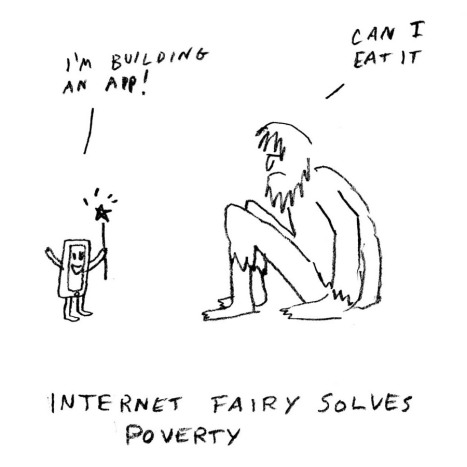Yesterday, I was an invited guest at an annual “entrepreneurship” event held in Vancouver. The event is an extraordinary opportunity to connect with most of the major figures, leaders, and investors in the entrepreneurship community. It also prominently showcased presentations from a number of the most promising new startups. But the undercurrents in conversations around the room were soul searching questions about the current glut of startup accelerators around North America, and the frothy euphoria and enthusiasm about “entrepreneurship.” Some experienced entrepreneurial investors complained about the air of unreality of it all, and the excess of mediocre companies being cranked out. A very prominent and experienced Vancouver venture capitalist pointed out to me that a glut of Canadian startups only compounds the long-standing issue that Canada could not produce the necessary risk capital even if more of these companies were investment ready, which they are not. A related issues is the waste of government money in these companies. Clearly, the situation is a mess.

Yesterday, I was an invited guest at an annual “entrepreneurship” event held in Vancouver. The event is an extraordinary opportunity to connect with most of the major figures, leaders, and investors in the entrepreneurship community. It also prominently showcased presentations from a number of the most promising new startups. But the undercurrents in conversations around the room were soul searching questions about the current glut of startup accelerators around North America, and the frothy euphoria and enthusiasm about “entrepreneurship.” Some experienced entrepreneurial investors complained about the air of unreality of it all, and the excess of mediocre companies being cranked out. A very prominent and experienced Vancouver venture capitalist pointed out to me that a glut of Canadian startups only compounds the long-standing issue that Canada could not produce the necessary risk capital even if more of these companies were investment ready, which they are not. A related issues is the waste of government money in these companies. Clearly, the situation is a mess.
But back to the central question: whether all this effort is producing real measurable results. Equally significant 1s the question, “Where are all the Big Ideas?” Some startups are focused on extremely esoteric niche markets, which is fine, but should they be included in serious, and very expensive accelerator programs? Some have suggested that there should be lesser tiers of services for companies like this. Many suggest that there is not enough “tough love”: up or out!
Ironically, when I returned home, I noticed that one of my friends, and a leader in the high tech accelerator community here, had forwarded to me an article from yesterday’s Financial Post, headlined, “Glut of Startup Accelerators Failing to Produce The Next Hootsuite or Shopify,” as if it were timed to underscore my conversations in Vancouver.
Read more: http://business.financialpost.com/2013/05/12/despite-their-numbers-accelerators-arent-producing-the-hootsuites-or-shopifys/
This is not a new problem.. For the last year a number of industry leaders, tech journalists and bloggers have been cranking out posts on this theme, and the rising evidence that it has become Problem One in the entrepreneurial world. Last December, PandoDaily published a post by Erin Griffith, titled, “We Know Accelerators are Headed for a Shakeout, But Do They?” Poignantly, the article highlighted the fact that Y Combinator in Silicon Valley, the paradigm for accelerators, announced that it was cutting its number of startups in it’s stable by almost half and reducing the size of their investments in response to all the over-enthusiasm.
Read more: http://pandodaily.com/2012/12/03/we-know-accelerators-are-headed-for-a-shakeout-but-do-they/
Another prominent high tech blogger, Francisco Dao, posted on his blog, “The Case for Fewer Entrepreneurs.” A well known and respected blogger, Dao asks many of the tough questions and argues that “less is more.”
Read more: http://mayo615.com/2013/02/12/1530/
The last problem is the crucial need to encourage bigger thinking, Bigger Ideas. If we are to have a meaningful effort in entrepreneurial accelerators, shouldn’t it be more like a Manhattan Project, by prioritizing the kinds of new ideas that have real potential to advance and improve human existence?
The Washington Post published an article last year with the title, “Moral Decline and the End of Big Ideas.” http://www.washingtonpost.com/national/on-innovations/moral-decline-and-the-end-of-big-ideas/2011/09/14/gIQAQntJwK_story.html The author’s point is that it is a sense of moral duty to make the world a better place that drives someone to change the World. Or at least it should be..
Another opinion piece in the New York Times by Neal Gabler, also last year, asks where are the Big Ideas? http://www.nytimes.com/2011/08/14/opinion/sunday/the-elusive-big-idea.html?pagewanted=all The Atlantic magazine had published a list of the ” 14 biggest ideas of the year,” the biggest of which, ironically was “The Rise of the Middle Class – Just Not Ours,” describing the rise of broad prosperity in the BRIC nations. The Atlantic list stimulated Gabler to predict a future of Big Data, but not Big Thought.. The implication I hear in Gabler’s editorial is that we are in a post Enlightenment time, a period of anti-intellectualism. I hope not, but I fear it may be true.









